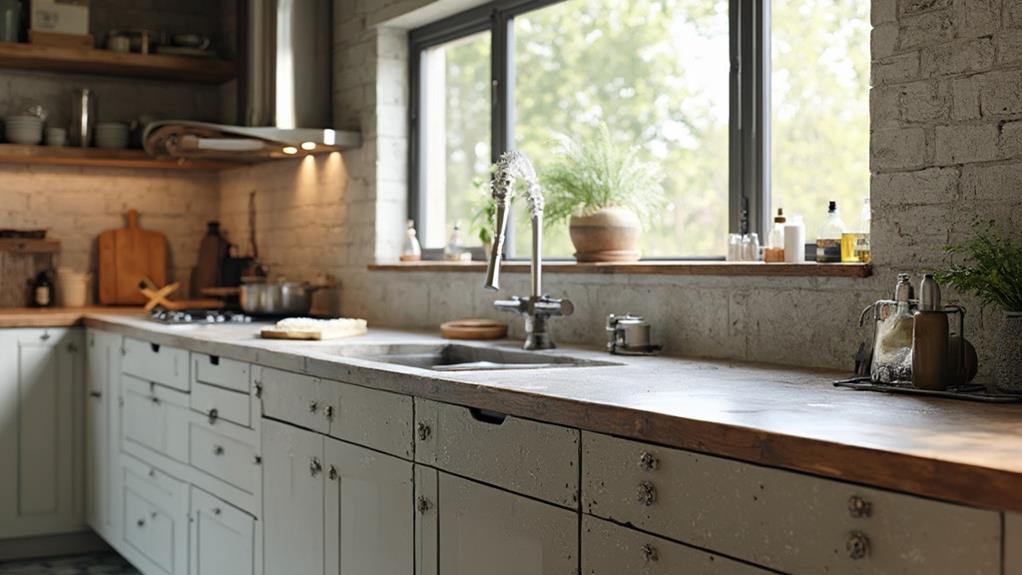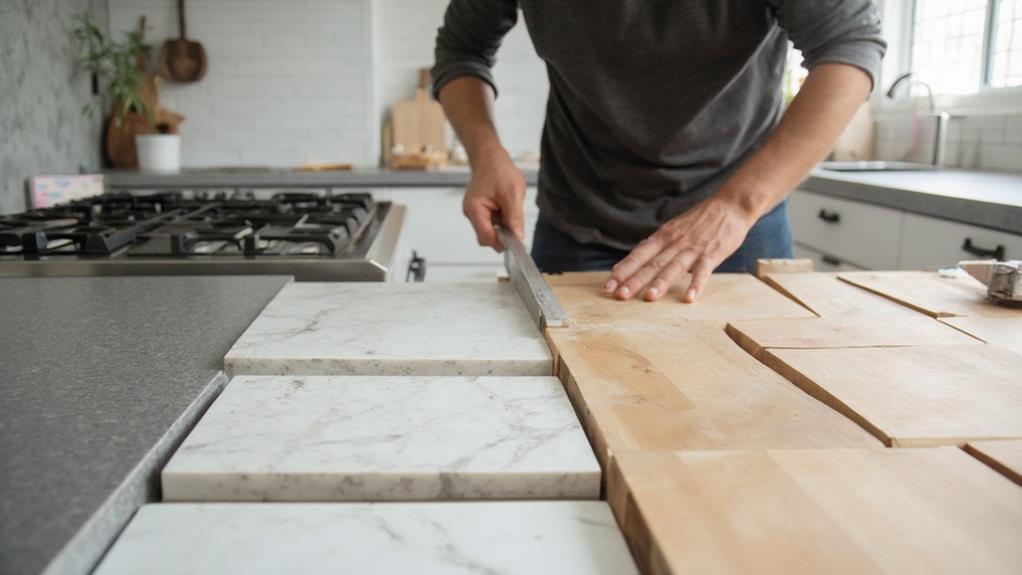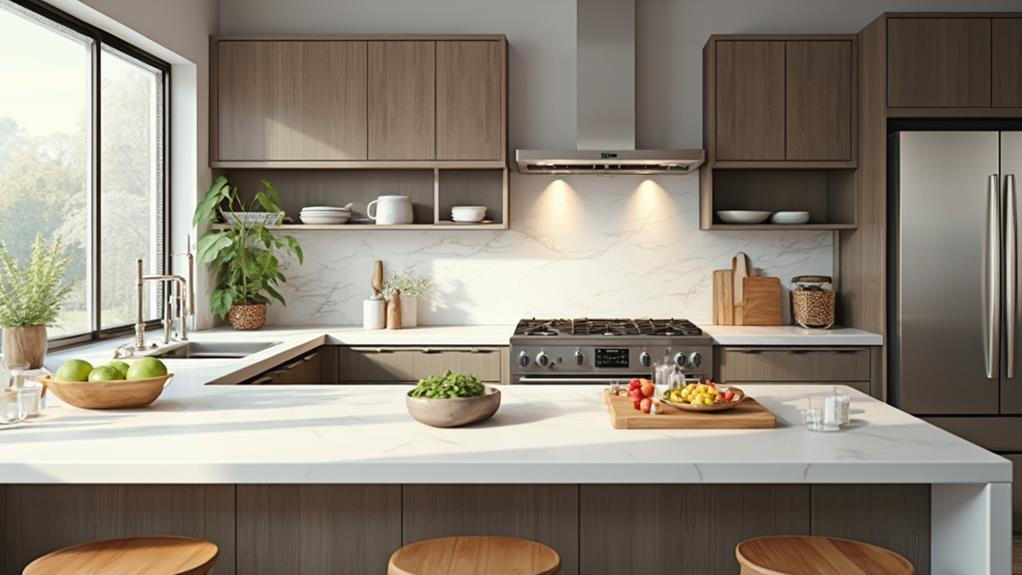Choosing the perfect kitchen countertop involves balancing durability, cost, and aesthetics. You'll find popular options like granite, quartz, marble, butcher block, and stainless steel, each with unique pros and cons. Consider your lifestyle and budget when evaluating factors like maintenance requirements, heat resistance, and stain susceptibility. Costs can range from budget-friendly laminate to high-end marble, with installation fees adding to the total. Don't forget to explore customization options, including edge profiles and sink placement, to create your ideal look. By understanding these key factors, you'll be well-equipped to make an informed decision that enhances your kitchen's functionality and style.
Popular Countertop Materials

Homeowners today have a wealth of options when it comes to kitchen countertops. The most popular materials include granite, quartz, marble, butcher block, and stainless steel. Each offers unique benefits and aesthetics to suit various preferences and budgets.
Granite remains a classic choice, prized for its durability and natural beauty. It's heat-resistant and comes in a wide array of colors and patterns.
Quartz, a engineered stone, has gained popularity for its low maintenance and consistent appearance. It's non-porous, making it highly resistant to stains and bacteria.
Marble adds luxury to any kitchen but requires more care due to its softer nature and susceptibility to etching. Butcher block countertops bring warmth and character to a space, though they need regular oiling and can be prone to scratches.
Stainless steel is favored in professional kitchens for its hygienic properties and heat resistance.
Other options include concrete, which offers a modern, industrial look; laminate, an affordable and versatile choice; and solid surface materials like Corian, known for their seamless appearance and easy repairs.
Consider your lifestyle, maintenance preferences, and budget when selecting the right countertop material for your kitchen.
Durability and Maintenance Factors
When selecting kitchen countertops, durability and maintenance requirements should be top considerations. Different materials vary significantly in their ability to withstand daily wear and tear, as well as their upkeep needs.
Granite and quartz are known for their durability, resisting scratches, heat, and stains. They're low-maintenance, requiring only regular cleaning with mild soap and water. Sealed granite needs resealing every few years, while quartz doesn't.
Butcher block and wood countertops are susceptible to scratches and water damage but can be sanded and refinished. They require regular oiling to maintain their appearance and prevent bacterial growth.
Laminate is affordable and easy to clean but can chip or scratch easily. It's not heat-resistant, so you'll need to use trivets and cutting boards.
Marble is elegant but porous, requiring frequent sealing to prevent stains. It's also prone to etching from acidic substances.
Stainless steel is durable and heat-resistant but can scratch and show fingerprints. Regular polishing keeps it looking its best.
Consider your lifestyle and cooking habits when choosing. If you're a frequent cook or have a busy household, opt for materials that can withstand heavy use and are easy to maintain.
Cost Considerations

The cost of kitchen countertops can vary dramatically based on material choice and installation complexity. You'll find that laminate is typically the most budget-friendly option, ranging from $20 to $50 per square foot installed.
Mid-range materials like granite, quartz, and solid surface countertops usually cost between $50 and $100 per square foot. For high-end options like marble, custom concrete, or exotic stone, you're looking at $100 to $200+ per square foot.
Don't forget to factor in additional costs beyond the material itself. Installation fees can add 20% to 50% to your total cost, depending on the complexity of the job. You might also need to budget for removal and disposal of your old countertops, as well as any necessary plumbing or electrical work.
If you're considering a DIY installation to save money, be aware that some materials, like quartz, require professional installation to maintain the warranty.
Remember to balance cost with longevity. While cheaper options may save you money upfront, more durable materials could prove more cost-effective in the long run by lasting longer and requiring less maintenance.
Aesthetic Options
Kitchen countertops' aesthetic appeal plays a crucial role in defining your space's overall look and feel. When exploring aesthetic options, you'll find a wide range of colors, patterns, and textures to suit your style.
Natural stone countertops like granite and marble offer unique veining and color variations, creating a luxurious atmosphere. If you prefer a more uniform look, engineered quartz provides consistent patterns and a wide color palette.
For a warm, rustic feel, consider butcher block or reclaimed wood countertops. These materials add character and can be easily refinished. Concrete countertops offer a modern, industrial vibe and can be customized with pigments or embedded objects.
If you're aiming for a sleek, contemporary look, stainless steel or glass countertops might be your best bet.
Don't forget about edge profiles, which can significantly impact your countertop's appearance. Options range from simple straight edges to more elaborate ogee or bullnose profiles. Additionally, consider how your chosen material will complement other elements in your kitchen, such as cabinets, backsplashes, and flooring.
Installation and Customization

After selecting your ideal countertop material and aesthetic, it's time to consider installation and customization options. The installation process varies depending on the material you've chosen. Some countertops, like laminate, can be a DIY project if you're handy. However, materials like granite, quartz, or marble typically require professional installation due to their weight and the precision needed for a proper fit.
When it comes to customization, you'll need to decide on edge profiles, such as straight, beveled, or bullnose. These can significantly impact the overall look of your countertops. You'll also need to consider sink placement and type. Undermount sinks are popular for solid surface countertops, while drop-in sinks work well with laminate.
Don't forget about backsplashes, which can be integrated or separate from your countertop. Integrated backsplashes offer a seamless look, while separate ones allow for more design flexibility.
Conclusion
You've now explored the countertop jungle, from granite peaks to quartz valleys. Like Odysseus navigating treacherous waters, you've weighed durability, cost, and aesthetics. Remember, there's no one-size-fits-all solution; your perfect countertop depends on your unique needs and style. Don't let analysis paralysis set in – trust your instincts and choose what feels right for your kitchen kingdom. With this guide as your map, you're ready to make a decision that'll serve you well for years to come.

